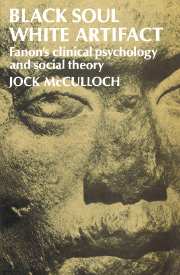Book contents
- Frontmatter
- Contents
- List of abbreviations
- Introduction
- Chapter 1 The three paradigms: negritude, ethnopsychiatry and African socialism
- Chapter 2 Negritude
- Chapter 3 Ethnopsychiatry and the psychopathology of colonialism: Fanon's account of colonised man in ‘Black Skin White Masks’
- Chapter 4 From psychiatric practice to political theory
- Chapter 5 Culture and personality
- Chapter 6 Class conflict and the liberation of Africa
- Chapter 7 The failed revolution
- Chapter 8 The neo-colonial state
- Chapter 9 Towards a critique of Fanon's class analysis
- Chapter 10 Conclusion
- Appendix I Fanon and Mannoni: conflicting psychologies of colonialism
- Appendix II Mental health in Algeria
- Notes
- Select Bibliography
- Index
Chapter 4 - From psychiatric practice to political theory
Published online by Cambridge University Press: 07 October 2009
- Frontmatter
- Contents
- List of abbreviations
- Introduction
- Chapter 1 The three paradigms: negritude, ethnopsychiatry and African socialism
- Chapter 2 Negritude
- Chapter 3 Ethnopsychiatry and the psychopathology of colonialism: Fanon's account of colonised man in ‘Black Skin White Masks’
- Chapter 4 From psychiatric practice to political theory
- Chapter 5 Culture and personality
- Chapter 6 Class conflict and the liberation of Africa
- Chapter 7 The failed revolution
- Chapter 8 The neo-colonial state
- Chapter 9 Towards a critique of Fanon's class analysis
- Chapter 10 Conclusion
- Appendix I Fanon and Mannoni: conflicting psychologies of colonialism
- Appendix II Mental health in Algeria
- Notes
- Select Bibliography
- Index
Summary
The clinical writings
All Fanon's works contain material dealing with psychiatric phenomena. This is true not only of the earlier and more clinical of his writings, Masks, and the formal psychiatric articles, but also the polemical texts Colonialism and The Wretched. Fanon himself makes no clear distinction between the political and the psychological realms, although rather curiously in the final section of The Wretched, he apologises for turning to the subject of psychopathology (p. 200). The question of the balance between political and psychological analysis in Fanon's theory is raised in the relationship between the earlier and later texts. Some critics have gone so far as to compare Fanon's intellectual development with that of Marx, the progression in Fanon's case being from psychopathology (Masks) to revolutionary socialism (The Wretched), while Marx's advance was from philosophy to politics.
Fanon's writing displays a marked political radicalisation as a result of his Algerian experience. There is in effect a considerable ideological distance between the authors of Masks and The Wretched. But the Algerian experience does not explain how, in terms of the inner workings of his theory, the changing focus of Fanon's thought occurred. Nor does biography alone tell us how Fanon chose to resolve those important questions dealing with personality and politics first raised in his study of the Antilles.
By examining certain of the clinical papers Fanon published between the years 1954 and 1958, it becomes possible to unravel the complex relationship between his early and later works.
- Type
- Chapter
- Information
- Black Soul, White ArtifactFanon's Clinical Psychology and Social Theory, pp. 82 - 117Publisher: Cambridge University PressPrint publication year: 1983



